Israel-Hamas War: What happened on day 95?
IDF takes responsibility for killing head of Hezbollah's drone operations • Israeli fire led to death of six soldiers in Gaza blast
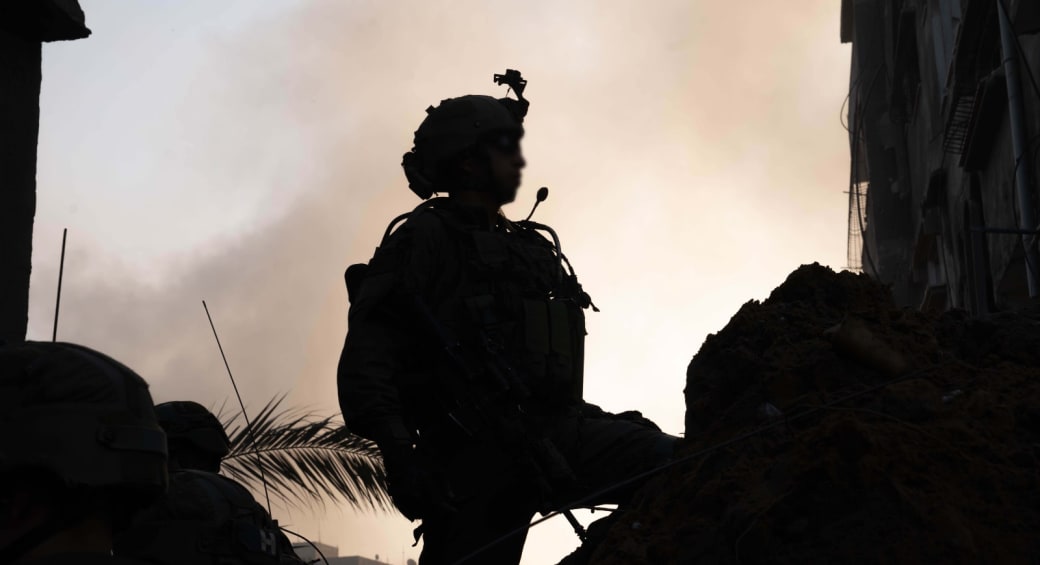

Israeli fire led to death of nine soldiers in Gaza blast - IDF
Six of the killed soldiers and most of the wounded came from an incident with explosive material near the partially underground and partially above-ground Hamas rocket manufacturing factory.
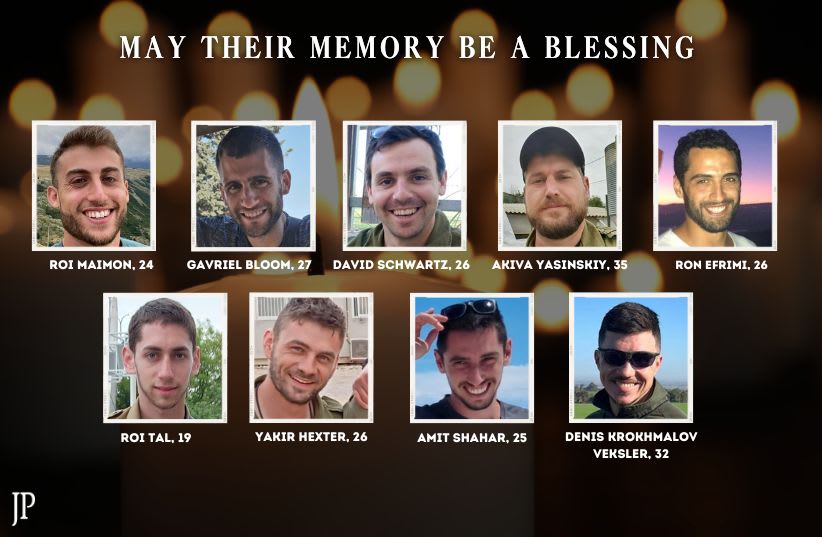
Nine IDF soldiers were killed in three incidents in Gaza on Monday, with eight soldiers wounded.
Six of the killed soldiers and most of the wounded came from an incident with explosive material near the partially underground and partially above-ground Hamas rocket manufacturing factory uncovered by the IDF at al-Bureij in central Gaza.
Israeli fire on a Gaza utility pole caused the blast inside a terror tunnel that led to the death of six IDF fighters on Tuesday, as per new details published on Tuesday evening by Israeli media.
A truck was bringing explosive material to soldiers operating near the partially underground and partially above-ground Hamas rocket manufacturing factory uncovered by the IDF at al-Bureij in central Gaza.
Israeli forces were going to use it to explode and destroy aspects of the Hamas manufacturing facility.
The incident, in which six soldiers were killed and a number wounded, occurred after an Israeli tank fired at what it identified as a suspicious terrorist target during operations across the Strip.
The tank fired two shells, one hitting its target and the other landing on the utility pole, causing an explosion around thirty minutes before planned and killing the soldiers.
There was another incident in Khan Yunis in which two soldiers died and a third incident elsewhere in which another soldier died.
Go to the full article >>Saudi Arabia wants peace with Israel after Gaza war, envoy tells BBC
Saudi Arabian ambassador to the UK said to the BBC on Tuesday that his country is interested in normalization with Israel after the war, with one condition - the creation of a Palestinian State.
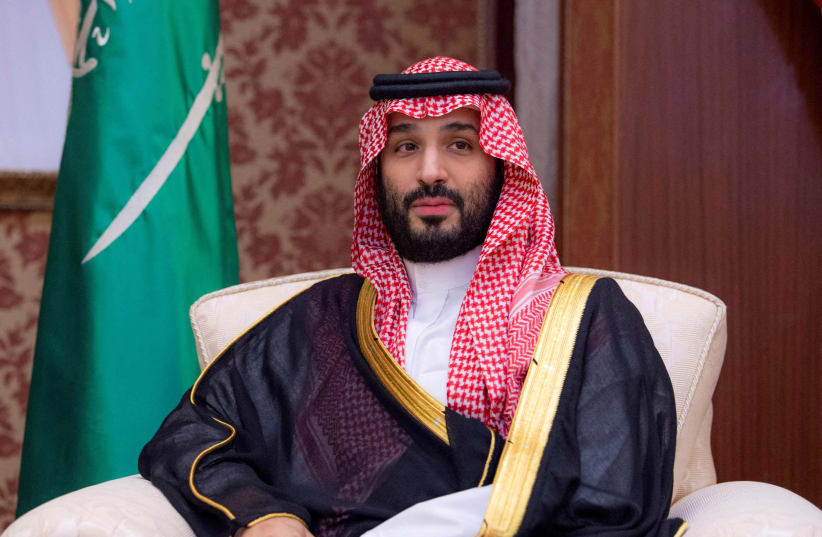
Saudi Arabia is interested in normalization with Israel following the conclusion of the IDF's war on Hamas in Gaza, the Saudi ambassador to the UK, Khalid bin Bandar Al Saud, said in an interview with the BBC on Tuesday.
However, the envoy said, Saudi Arabia had one condition - the creation of a Palestinian State.
According to the ambassador, prior to the October 7 massacre, both countries were close to reaching an agreement.
The basis for Saudi Arabian normalization agreement
He explained, "For us, the final endpoint definitely included nothing less than an independent state of Palestine. So, while we still - going forward after 7 October - believe in normalization, it does not come at the cost of the Palestinian people," adding as a final note, "One doesn't come without the other."
The ambassador voiced his disapproval at the reaction of the international community to the situation in Gaza, saying its efforts at ending the fighting and sending humanitarian aid to the Strip were insufficient.
Go to the full article >>Jerusalem teen terrorist wanted to be a Hamas 'martyr,' left note
She expressed a desire to be recognized as a martyr and indicated her support for the Hamas terrorist organization.
Israel Police successfully located and arrested a 14-year-old girl who intended to carry out a terror attack in the Old City of Jerusalem on Tuesday evening, police said.
According to police, a 14-year-old resident of east Jerusalem left a "farewell" letter near a house in the Old City, where she expressed a desire to be recognized as a martyr and indicated her support for the Hamas terrorist organization.
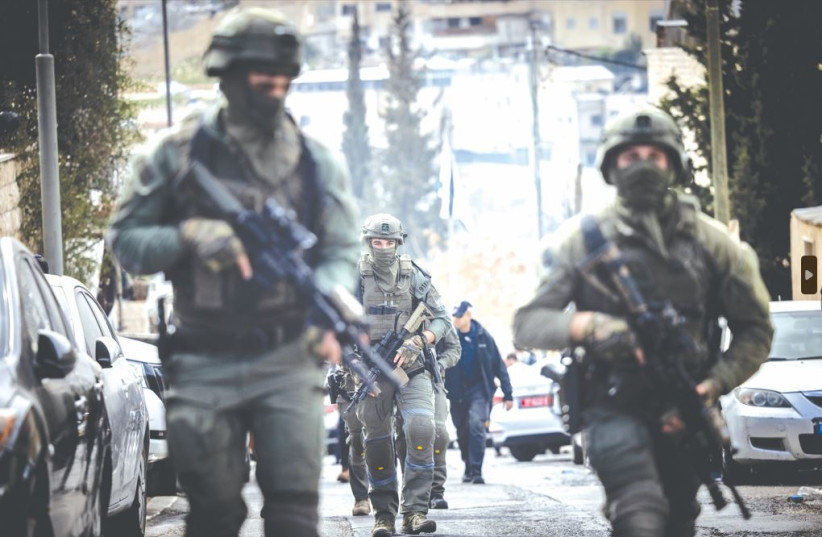
Police officers from the David area who discovered the letter, together with the Jerusalem District Police, arrested the suspect near the Old City with photos of terrorists in her possession. The investigation by the police indicates that she intended to carry out an attack.
Family history
The investigation also revealed that the suspect's father is a terrorist who carried out an attack about a year ago in the West Bank. He was neutralized and eliminated in the attack, in which several members of the security forces were injured.
The suspect, who was arrested by the police, was brought today to discuss the extension of her detention at the High Court, and her detention was extended until January 12 in order to continue the investigation until its completion.
Go to the full article >>UK's Cameron: Worried Israel may have breached international law in Gaza
Britain's foreign minister David Cameron said on Tuesday he was worried that Israel might have taken action in Gaza that might be in breach of international law.
"Am I worried that Israel has taken action that might be in breach of international law, because this particular premises has been bombed, or whatever? Yes, of course," Cameron said as he took questions from parliament's foreign affairs committee.
Go to the full article >>ICJ claim against Israel is absurd, Hungarian FM tells Israel Katz
"The complaint against Israel is absurd," Hungarian Foreign Minister Péter Szijjártó told Foreign Minister Israel Katz on Tuesday, expressing Hungary's categoric disapproval of the genocide claim against Israel in the International Court of Justice at the Hague.
Katz spoke with his counterpart Szijjártó, who congratulated Katz on the occasion of his accession to office as Foreign Minister. Szijjártó emphasized Hungary's support for Israel's self-defense following the October 7 massacre and called for the immediate release of all the hostages in Gaza.
The two ministers are expected to meet next week in Jerusalem as part of the continued strengthening of relations between Israel and Hungary.
The Foreign Minister said, "I thank the Hungarian Foreign Minister Szijjártó, a true friend of Israel, for his important public support. I am happy that Minister Szijjártó responded to my request and pledged to continue standing by Israel's side in the international arena, and in particular against South Africa's absurd claim at the International Court of Justice in The Hague. This institution was established to protect those who were attacked - and not those who attacked."
Go to the full article >>IDF finds 100 mortar bombs in massive weapons bust in Gaza's Khan Yunis
During the operations, weapons were discovered in classrooms, including Kalashnikov rifles, cartridges, ammunition, Hamas flags, and safes containing money belonging to Hamas.
The IDF released footage on Tuesday evening of the Givati Brigade's latest operations in Khan Yunis in Gaza.
In the footage, infantry soldiers of the Givati Brigade can be seen destroying terrorist infrastructures, eliminating terrorists in battles, and uncovering many weapons caches used by the terrorist organization Hamas.
With support from the Intelligence Corps, the soldiers also conducted operations inside the Islamic University in Khan Yunis, which was used as a stronghold for the terror organization.
During the operations, weapons were discovered in classrooms, including Kalashnikov rifles, cartridges, ammunition, Hamas flags, and safes containing money belonging to Hamas.
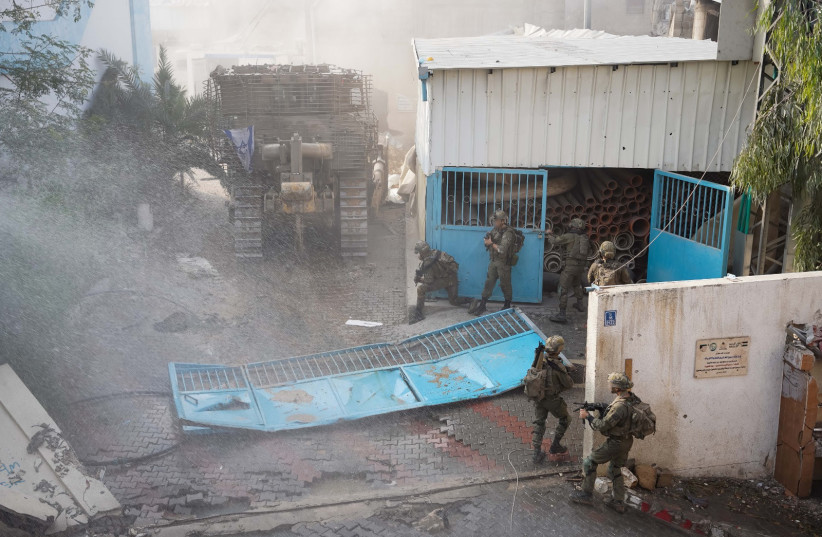
In another operation, the soldiers carried out searches in the area surrounding the university. Throughout the searches, the forces successfully discovered dozens of weapons caches that contained about 100 mortar bombs, ready-to-use charges, grenades, combat equipment, and maps used by the Hamas terrorists.
Go to the full article >>IDF withdraws thousands of soldiers from Gaza's north - report
The IDF had already withdrawn several thousand soldiers from the Gaza Strip as part of its transition into the third stage of fighting Hamas in the Strip, the Washington Post reported Tuesday, citing a senior US official.
As per the Post, the IDF is now undergoing a "significant drawdown" in Gaza's north.
This is a developing story.
Go to the full article >>Lebanon ready for talks on long-term border stability, PM says
The border violence has forced tens of thousands of people to flee on both sides and raised fears the conflict could spiral.
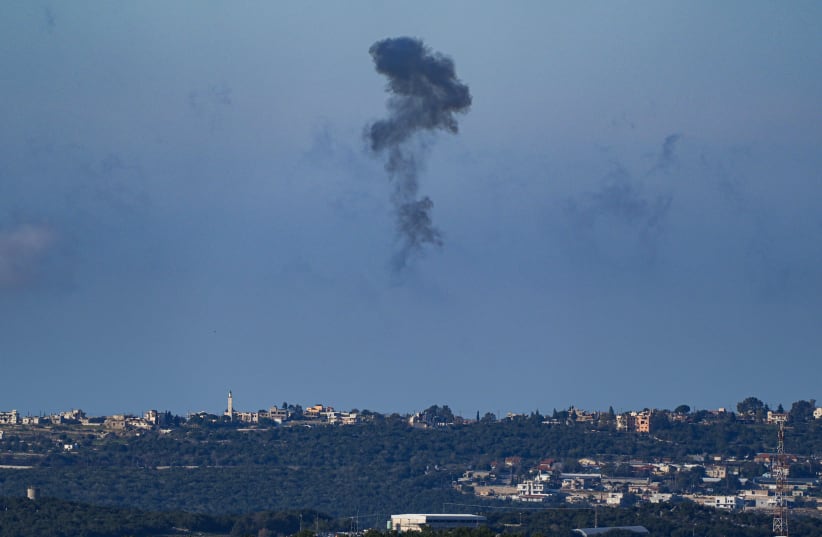
Lebanon's caretaker prime minister Najib Mikati told a senior United Nations official on Tuesday that his country was ready for talks on long-term stability on its southern border with Israel.
Mikati's office said in a statement he met UN Under-Secretary-General for Peace Operations Jean-Pierre Lacroix in Beirut to reiterate "Lebanon's readiness to enter negotiations to achieve a long-term process of stability in southern Lebanon" along the border with Israel.
"We seek permanent stability and call for a lasting peaceful solution - but in return we receive warnings through international envoys about a war on Lebanon," Mikati said.
"The position I repeat to these delegates is: Do you support the idea of destruction? Is what is happening in Gaza acceptable?"
Lebanese armed group Hezbollah has been trading fire with the Israeli military across Lebanon's southern border since Hamas terrorists attacked Israel from the Palestinian enclave of Gaza on Oct. 7.
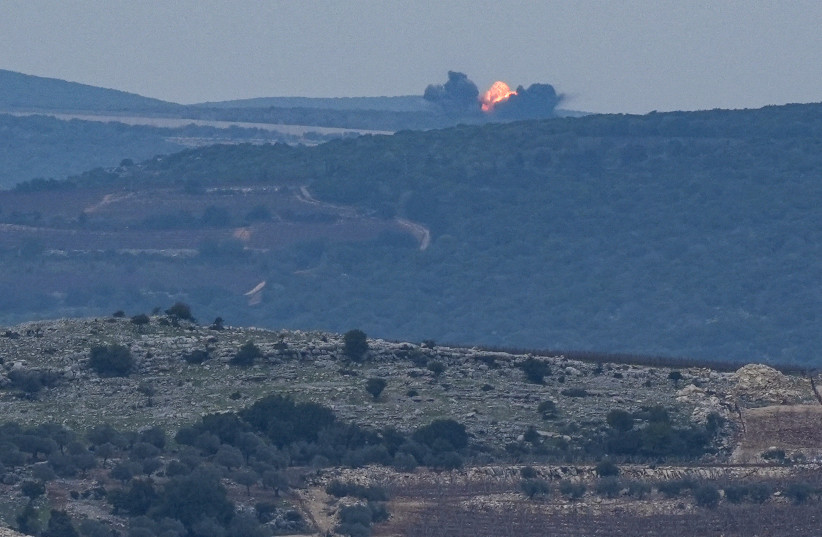
Border violence impacting both sides
The border violence has forced tens of thousands of people to flee on both sides and raised fears the conflict could spiral.
Israel has said it is giving a chance for diplomacy to prevent Hezbollah firing on people living in its north and to push Hezbollah back from the border, warning that the Israeli army will otherwise take action to achieve these aims.
Hezbollah has said it does not seek full-scale war but would not hold back if Israel starts one.
Mikati's statement did not specify the type of negotiations to which Lebanon would be open, including whether they would be direct or mediated.
Last year, US envoy Amos Hochstein floated the possibility of talks on drawing the land border between Israel and Lebanon, after having mediated a 2022 deal setting the maritime borders between the two countries.
The current demarcation line between the two countries is known as the Blue Line, a frontier mapped by the United Nations that marks the line to which Israeli forces withdrew when they left south Lebanon in 2000.
Go to the full article >>Egypt rejects Israeli request to monitor buffer zone with Gaza
Egyptian Foreign Minister Sameh Shoukry said on Tuesday that the priorities for Gaza were a ceasefire, delivery of aid, and preventing displacement of Gazans into Egypt.
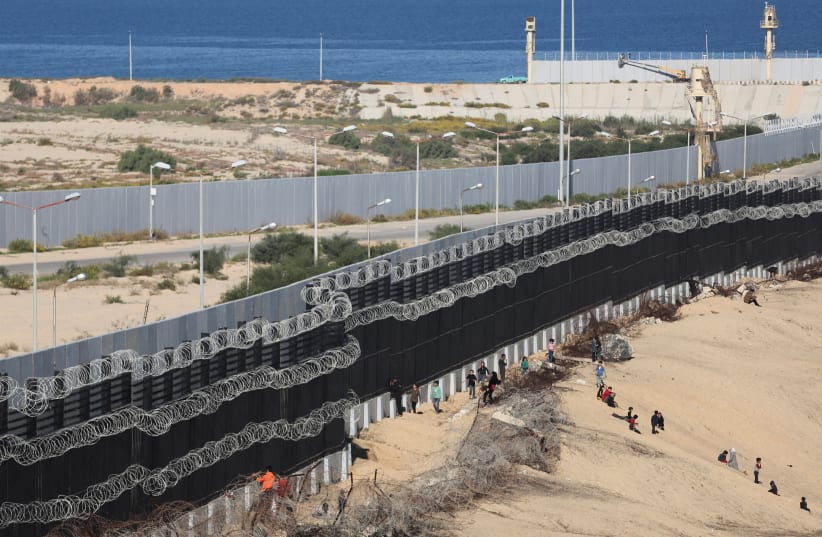
Egypt has rejected a proposal by Israel for greater Israeli oversight over the buffer zone on the Egypt-Gaza border and is prioritizing efforts to broker a ceasefire before working on post-war arrangements, three Egyptian security sources said.
Egypt shares a 13km (8 mile) border with Gaza which is the only border of the Palestinian coastal enclave not directly controlled by Israel. Along with Qatar, Egypt has also played a leading role in talks to broker a new ceasefire in Gaza and secure a deal for the release of Israeli hostages held by Hamas.
The Egyptian sources said that during those talks Israel had approached Egypt about securing the Philadelphi Corridor, a narrow buffer zone along the border, as part of Israeli plans to prevent future attacks.
The current conflict began on Oct. 7 when Hamas launched an incursion during which Israel said 1,200 people were killed and some 240 hostages captured.
Israel has retaliated with an offensive that has killed more than 23,000 people, according to Gaza officials, and driven most of the territory's 2.3 million people from their homes.
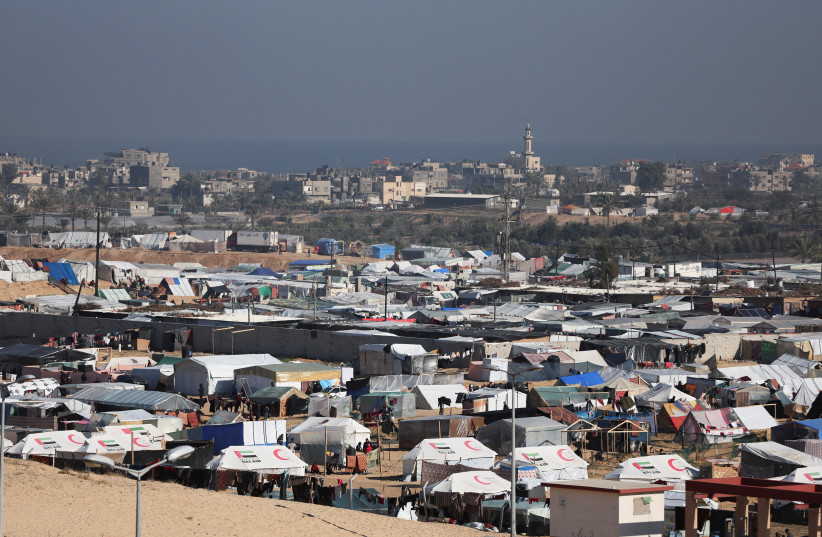
An Israeli official, speaking on condition of anonymity, said joint monitoring Philadelphi Corridor with Egypt was among issues that have been discussed by the countries.
Asked if Egypt had refused, the Israeli official said: "I'm not aware of that."
Egypt's state-linked Al Qahera News cited an anonymous source on Monday as saying that recent reports of planned cooperation between Egypt and Israel on the corridor were false.
The head of Egypt's State Information Service did not respond to a request for comment.
The Egyptian sources said that Israeli officials did not discuss control of the corridor during the current ceasefire talks, but instead asked to participate in monitoring the area, including by sharing usage of new monitoring technology Israel would procure.
Egyptian negotiators rejected the idea, but Egypt has bolstered the physical barriers on its side of the border, the sources said.
Egypt is prioritizing reaching a new ceasefire agreement as the necessary foundation for discussions about post-war Gaza, including securing the corridor, the sources added.
Tunnels
Egyptian Foreign Minister Sameh Shoukry said on Tuesday that the priorities for Gaza were a ceasefire, delivery of aid, and preventing displacement of Gazans into Egypt.
Israel controlled the Philadelphi Corridor until 2005 when it ended its occupation of the Gaza Strip. Hamas seized control of Gaza in 2007. Late last month, Israeli Prime Minister Benjamin Netanyahu said Israel sought to re-assert control of the corridor, under which Palestinians have long run underground tunnels.
The number of tunnels began increasing in 2008, as Palestinian smugglers and terrorists used them to evade an Israel economic blockade and to bring weapons into the enclave. But an Egyptian military campaign that began in 2013 managed to destroy most of them, Palestinian sources say.
"Egypt made clear it closed all tunnels on its side of the border, but Israel is still unable to absorb or understand that what they saw in Gaza could be all locally-manufactured, or developed," said Ashraf Abu el-Houl, managing editor of Egyptian state-owned paper Al-Ahram and a specialist on Palestinian issues.
Abou el-Houl said Israel could effectively control the border buffer zone from afar through its firepower, without needing to take direct control.
There have been repeated bombardments near the border area, including at the Rafah Crossing, which has been used to bring humanitarian aid into Gaza from Egypt and to evacuate small numbers of the Palestinians needing urgent medical treatment.
Go to the full article >>Is Lebanon's power vacuum an obstacle for solution in Israel, Hezbollah fighting?
As international efforts soar to reach a diplomatic solution to ease the tensions on the Israeli-Lebanese border, Lebanon’s political instability could present a challenge
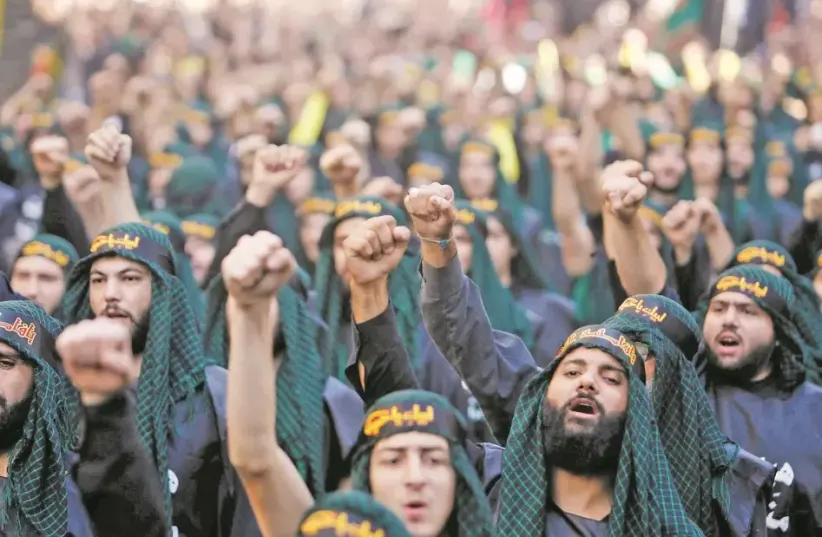
As tensions continue to grow on the Israel-Lebanon border, international efforts to reach a diplomatic solution are intensifying. However, given the complexities of Lebanon’s current political situation, a diplomatic solution in which Hezbollah withdraws to north of the Litani River is not easily achievable despite vows of cooperation from Lebanese leadership.
Since the Israel-Hamas war started on October 7, Hezbollah has fired rockets into northern Israel daily. The Iranian proxy’s group leader, Hassan Nasrallah, has declared that the attacks are done to help “their brothers in Gaza.” Israel has retaliated and killed over 150 Hezbollah operatives. The tension has been sustained at almost the same level for three months and has not yet escalated into an all-out war.
However, dozens of towns in northern Israel have been evacuated, and their residents are still internally displaced. According to Israel’s assessment, to be safe enough for Israelis to return to their homes, Hezbollah must retire to north of the Litani River, otherwise, there is still a possibility of war erupting.
Meeting with Lebanese officials
Before US Secretary of State Antony Blinken visited the region, Amos Hochstein, President Biden’s special envoy who mediated the negotiations for Israel and Lebanon’s maritime border denomination, met last Wednesday with Lebanon’s caretaker Foreign Minister Abdallah Bou Habib before arriving in Israel on Thursday. Once in Israel, Hochstein met with several officials in the Israeli leadership in a bid to set the ground for negotiations to avoid an all-out conflict between Israel and Hezbollah.
According to Ynet, a senior Israeli security official said, “Israel extends its hand for a diplomatic solution, emphasizing that it does not play games. However, any arrangement must include the removal of Hezbollah forces from the border to a distance that prevents immediate threats to northern settlements.”
As part of the possible negotiations, a new terrestrial border demarcation could be discussed as there are still areas along the northern border that both countries claim.
Go to the full article >>Israel-Hamas War: What you need to know
- Hamas launched a massive attack on October 7, with thousands of terrorists infiltrating from the Gaza border and taking some 240 hostages into Gaza
- Over 1,200 Israelis and foreign nationals were murdered, including over 350 in the Re'im music festival and hundreds of Israeli civilians across Gaza border communities